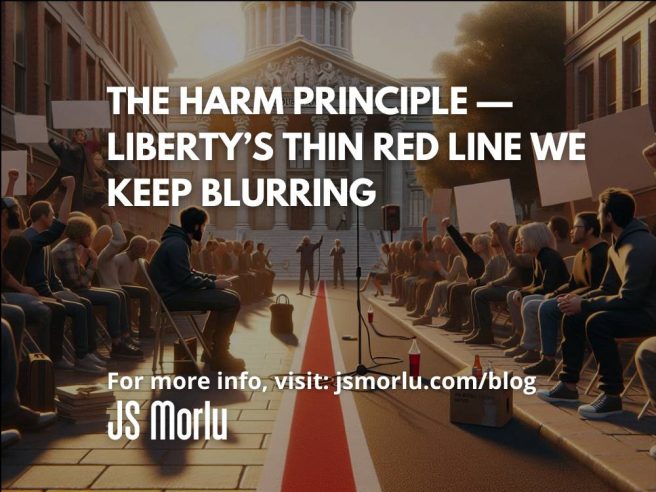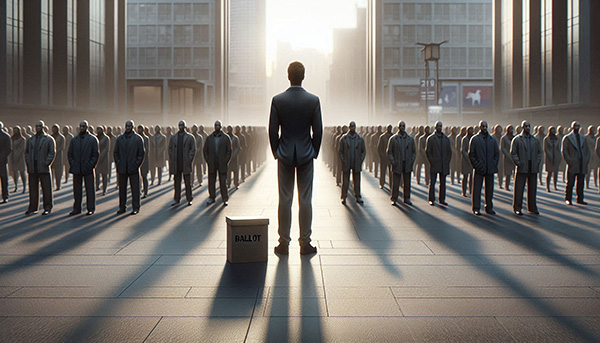By: John S. Morlu II, CPA
In 1859, John Stuart Mill looked at the human herd and basically said:
“Look, people will always have opinions about how you live. But unless you’re hurting someone, they should leave you alone.”
That’s the Harm Principle — the idea that the only reason the state or society should interfere in your life is to stop you from harming others.
It sounds simple. It is simple. That’s why it’s so hard for people to follow.
Harm vs. Hurt Feelings
Mill drew a bright line between harm and offense:
- Harm: punching someone, burning their house, stealing their cow, dumping toxins into the river.
- Offense: saying pineapple on pizza is superior (or inferior), holding a protest sign that makes your neighbor grumble.
He thought offense was inevitable in a free society and, frankly, good for you — like intellectual cold showers.
But harm? That’s where society gets to step in and say, “Stop right there.”
Modern life often confuses the two.
Today, people shout: “I’m offended, therefore I’m harmed!”
Mill would have rolled his eyes and said: “That’s not how this works.”
Liberty as an Experiment
Mill wasn’t just defending weirdos for the sake of weirdness.
He believed that freedom to live differently — even to fail — was how societies progress.
Every eccentric person trying something new (odd diets, funky politics, strange art) is running a little social experiment.
Some experiments flop. Others change the world.
Without that freedom, we’d still be debating whether the earth is flat.
Speech: The Original Sandbox Mode
Mill’s most famous application of the principle was about speech.
Silencing an opinion, he said, is like robbing the human race.
- If the opinion is wrong, arguing against it sharpens our understanding.
- If it’s right, we need it to fix our mistakes.
- If it’s half-right, we need the debate to find the missing half.
Today, that line still burns in free-speech debates.
Mill would probably tell modern cancel-culture warriors and authoritarian governments alike: “You don’t have to like what people say — just don’t break their legs over it.”
Paternalism: The Nanny State’s Bad Habit
Mill loathed the idea that governments exist to make adults behave like obedient children.
If you want to climb a mountain without a helmet, Mill thought that was your business — as long as you didn’t push someone else off the cliff on the way up.
He wasn’t saying self-harm is wise. He just believed:
The right to be wrong is still a right.
The Tyranny of the Majority
Mill didn’t trust crowds either. He warned that public opinion itself can become a bully, crushing individuality without passing a single law.
Translation: even if you win the vote, you don’t get to micromanage your neighbor’s soul.
The Messy Part: Defining Harm
The tricky question is: what counts as harm?
- Dumping sewage in the river? Clearly harm.
- Spreading fake news about vaccines? Fuzzy — but arguably harm.
- Eating a burger in front of a vegan? Not harm… though it might ruin their appetite.
Mill didn’t solve this completely. Modern democracies wrestle with it every day — from social-media regulation to climate policy.
From Mill to Modern Life
Mill’s principle underpins:
- Freedom of religion and conscience
- Free press and protest rights
- Limited government interference in personal choices
- Liberal democracies’ obsession with “consent” and “rights”
But it also explains why we debate:
- Smoking bans in public spaces
- Vaccine mandates in pandemics
- Hate-speech laws
- Big Tech content moderation
Mill would say: “Show me the harm.”
And the argument begins.
A Satirical Reality Check
Imagine if Mill came back today and scrolled through social media:
“You mean to tell me you’re fighting entire wars over memes and hashtags… and calling it ‘harm’?”
He might wonder whether we still understand the difference between a bad opinion and a broken nose.
The Big Idea, Distilled
The Harm Principle boils down to:
- Your freedom to swing your fist ends where someone else’s nose begins.
- A society that polices every offense ends up strangling its own creativity.
- Liberty is risky. That’s the point.
Why It Still Matters
Mill’s century-old line in the sand is still the battleground for modern democracies:
- When does protecting people cross into controlling them?
- How do we live together when my “freedom” annoys you but doesn’t harm you?
- Can we grow up enough to accept that some things will always offend us?
Closing Punchline
Mill’s Harm Principle is not just a legal doctrine; it’s an adult-test for civilizations.
A free society requires thick skins and thin red lines.
Lose sight of the difference between harm and hurt feelings, and liberty dies — not with a bang, but with a million offended tweets.
Author: John S. Morlu II, CPA is the CEO and Chief Strategist of JS Morlu, leads a globally recognized public accounting and management consultancy firm. Under his visionary leadership, JS Morlu has become a pioneer in developing cutting-edge technologies across B2B, B2C, P2P, and B2G verticals. The firm’s groundbreaking innovations include AI-powered reconciliation software (ReckSoft.com) and advanced cloud accounting solutions (FinovatePro.com), setting new industry standards for efficiency, accuracy, and technological excellence.
JS Morlu LLC is a top-tier accounting firm based in Woodbridge, Virginia, with a team of highly experienced and qualified CPAs and business advisors. We are dedicated to providing comprehensive accounting, tax, and business advisory services to clients throughout the Washington, D.C. Metro Area and the surrounding regions. With over a decade of experience, we have cultivated a deep understanding of our clients’ needs and aspirations. We recognize that our clients seek more than just value-added accounting services; they seek a trusted partner who can guide them towards achieving their business goals and personal financial well-being.
Talk to us || What our clients says about us






